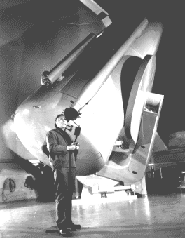 Edwin Powell Hubble
Edwin Powell Hubble
The American astronomer Edwin Powell Hubble, b. Marshfield, Mo.,
Nov. 20, 1889, d. Sept. 28, 1953, was a pioneer in the study of
extragalactic astronomy. He composed (1925) the classification
scheme for the structure of galaxies that is still in use today
and provided the conclusive observational evidence for the
expansion of the universe. A graduate of the University of
Chicago, where he studied physics and astronomy and excelled as a
heavyweight boxer, Hubble obtained a law degree at Oxford and
briefly practiced law before earning his Ph.D. in astronomy at
Chicago in 1917. After World War I, Hubble went to Mount Wilson
Observatory, where in 1923 he settled a long debate by
demonstrating that the Andromeda nebula was far outside our
galaxy. This discovery established the so-called island universe
theory, which states that galaxies exist outside our own.
Hubble's study of the distribution of galaxies resulted in the
discovery (1929) of Hubble's law, from which the fundamental
cosmological quantity known as Hubble's constant is derived.

 Edwin Powell Hubble
Edwin Powell Hubble Edwin Powell Hubble
Edwin Powell Hubble